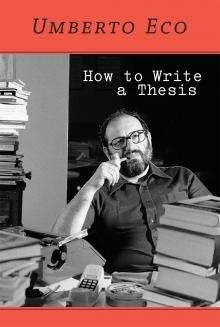How to Write a Thesis

Editorial MIT Press
Fecha de edición febrero 2015 · Edición nº 1
Idioma inglés
EAN 9780262527132
256 páginas
Libro
encuadernado en tapa blanda
Resumen del libro
By the time Umberto Eco published his best-selling novel The Name of the Rose, he was one of Italy's most celebrated intellectuals, a distinguished academic and the author of influential works on semiotics. Some years before that, in 1977, Eco published a little book for his students, How to Write a Thesis, in which he offered useful advice on all the steps involved in researching and writing a thesis from choosing a topic to organizing a work schedule to writing the final draft. Now in its twenty-third edition in Italy and translated into seventeen languages, How to Write a Thesis has become a classic. Remarkably, this is its first, long overdue publication in English.
Eco's approach is anything but dry and academic. He not only offers practical advice but also considers larger questions about the value of the thesis-writing exercise. How to Write a Thesis is unlike any other writing manual. It reads like a novel. It is opinionated. It is frequently irreverent, sometimes polemical, and often hilarious. Eco advises students how to avoid thesis neurosis and he answers the important question Must You Read Books? He reminds students You are not Proust and Write everything that comes into your head, but only in the first draft. Of course, there was no Internet in 1977, but Eco's index card research system offers important lessons about critical thinking and information curating for students of today who may be burdened by Big Data.
Biografía del autor
Medievalista, semiólogo, filósofo y experto en medios de comunicación. Nació en Alessandria en 1932 y murió en Milán en 2016. Su debut como novelista, El nombre de la rosa (1988), lo dio a conocer en el panorama literario. A este éxito le siguieron varias novelas de ficción, aunque, desde 1975, Eco había cultivado el ensayo en disciplinas como la semiótica, la lingüística y la filosofía. Fue profesor universitario y ejerció de crítico literario.








